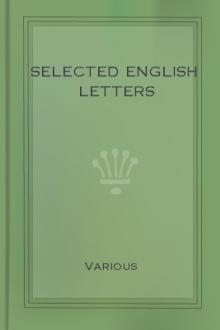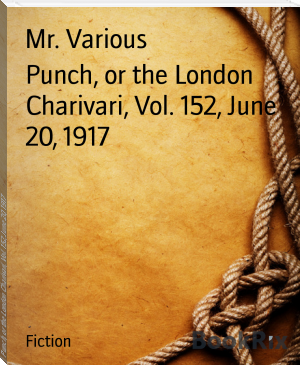Selected English Letters by - (free e novels txt) 📕

- Author: -
- Performer: -
Book online «Selected English Letters by - (free e novels txt) 📕». Author -
1621-1685
TO HER DAUGHTER IN LONDONThree interesting postscripts
[Norfolk, 28 June, c. 1679.]
DEARE DAUGHTER,I have received all the things, to the great content of the owners, who returne you many thankes. Thay ar indeed very well chose things of all sorts: and I give you many thanks for the troble you have had with them: I sent you Tomey's scurt and long slevs of his ould cott; I hope you have them. On Mr. Felden it seemes took it last Wadinsday, and sayd hee would deliver it him selfe. Wee dayly wish for the new cloths; all our linen being worne out but shefts, and Tomey would give all his stock to see his briches. I bless God wee ar all well as I hope you ar. Tomey presents his dutty, your sisters all love and services.
[4 July.]
GOOD DAUGHTER,I must troble you once more abought my cosen Tenoson. She would macke a manto gown of the grene and whight silke you sent down for a peticot, but she wants two yards, and as much slit grene sarsinat as will line it in sight. I pray send nurs to gett it and lett mee know what it com to, and I will send you the mony. I sayes my Cossen Cradock might send it me by the choch for she would have it as sonne as possible. I bless God wee ar all in helth, and Tomey much longing for his briches.
[5 July.]
Tomey have received his cloues, and is much delighted, and sends you and his mother and grandmother dutty and thanckes, and meanes to war them carfully.
GEORGE, LORD BERKELEY1628-1698
To SAMUEL PEPYS[1]
Honourable Acquittal
Berkeley House, 23 Feb. 1677-8.
GOOD MR. PEPYS,Though I thank you for the favour of your letter, yet I confess myself both much surprised and troubled to receive a letter from you upon such an occasion: so is my wife, who professes herself wholly innocent of any crime of charging you in thought, word, or deed, and hopes you will do her that right to believe so of her. My daughter Berkeley says she expressed some trouble that the friend she recommended had not success, and that she was told the Commissioners of the Navy did report they had given the same recommendations of the person she proposed, as they did of him that was accepted, for the lieutenant's place; which my daughter, supposing to be true, wondered the more he lost the preferment: but, by the copies enclosed in your's, it appears her Ladyship was very much misinformed. As for Mrs. Henrietta, she is extremely troubled in saying any thing that gave you offence; and though she did not in the least intend it, yet she begs your pardon. And now, my good friend, though I am not under any accusation, and therefore need not say any thing to vindicate myself, yet give me leave, upon this occasion, to assure you, that there is no person has a better opinion of you than myself, nor is more sensible of your particular civilities to me; which I should be very glad to make a return of when in my power to serve you: and give me leave to add further, without flattery to you, and with great sincerity, that I believe our gracious master, His Majesty, is so fortunate in employing you in his service, that, if he should lose you, it would be very difficult for His Majesty to find a successor so well qualified in all respects for his service, if we consider both your integrity, vast abilities, industry, and zealous affections for his service; and, if His Majesty were asked the question, I will hold ten to one His Majesty declares himself of my opinion; so will I believe all that know you, more especially our fellow-traders that are so conversant with you and obliged by you.
This is asserted as a great truth by, Sir, your very affectionate and hearty friend and Servant.
[Footnote 1: Cf. Letter on p. 45.]
DOROTHY OSBORNE1628-1698
To SIR WILLIAM TEMPLE
Passing the time
[No date; c. 1653.]
I have been reckoning up how many faults you lay to my charge in your last letter, and I find I am severe, unjust, unmerciful, and unkind! O me! how should one do to mend all those! 'Tis work for an age, and I fear that I shall be so old before I am good, that 'twill not be considerable to any body but myself whether I am so or not…. You ask me how I pass my time here. I can give you a perfect account, not only of what I do for the present, but what I am likely to do this seven years if I stay here so long. I rise in the morning reasonably early, and before I am ready I go round the house till I am weary of that, and then into the garden till it grows too hot for me. I then think of making me ready; and when that's done I go into my father's chamber; from thence to dinner, where my cousin Molle and I sit in great state in a room and at a table that would hold a great many more. After dinner we sit and talk till Mr. P. comes in question, and then I am gone. The heat of the day is spent in reading or working; and about six or seven o'clock I walk out into a common that lies hard by the house, where a great many young wenches keep sheep and cows, and sit in the shade singing of ballads; I go to them, and compare their voices and beauty to some ancient shepherdesses that I have read of, and find a vast difference there; but, trust me, I think these are as innocent as those could be. I talk to them, and find they want nothing to make them the happiest people in the world but the knowledge that they are so. Most commonly, while we are in the middle of our discourse, one looks about her, and spies her cows going into the corn, and then away they all run as if they had wings at their heels. I that am not so nimble stay behind, and when I see them driving home their cattle think it is time for me to return too. When I have supped I go into the garden, and so to the side of a small river that runs by it, where I sit down and wish you with me (you had best say this is not kind, neither). In earnest, it is a pleasant place, and would be more so to me if I had your company, as I sit there sometimes till I am lost with thinking; and were it not for some cruel thoughts of the crossness of my fortune, that will not let me sleep there, I should forget there were such a thing to be done as going to bed. Since I writ this, my company is increased by two, my brother Harry, and a fair niece, my brother Peyton's daughter. She is so much a woman that I am almost ashamed to say I am her aunt, and so pretty, that if I had any design to gain a servant I should not like her company; but I have none, and therefore I shall endeavour to keep her here as long as I can persuade her father to spare her, for she will easily consent to it, having so much of my humour (though it be the worst thing in her) as to like a melancholy place, and little company…. My father is reasonably well, but keeps his chamber still; but will hardly, I am afraid, ever be so perfectly recovered as to come abroad again.
TO THE SAMEAnother pretender
[No date; c. 1653.]
I could tell you such a story (it is too long to be written), as would make you see what I never discovered in my life before, that I am a valiant lady. In earnest, we have had such a skirmish and upon so foolish an occasion, as I cannot tell which is strangest. The Emperor and his proposals began it; I talked merrily on it till I saw my brother put on his sober face, and could hardly then believe he was in earnest. It seems he was; for when I had spoke freely my meaning it wrought so with him, as to fetch up all that lay upon his stomach: all the people that I had ever in my life refused were brought again upon the stage, like Richard the Third's ghosts, to reproach me withal, and all the kindness his discoveries could make I had for you was laid to my charge; my best qualities, if I have any that are good, served but for aggravations of my fault, and I was allowed to have wit, and understanding, and discretion, in all other things, that it might appear I had none in this. Well, 'twas a pretty lecture, and I grew warm with it after a while. In short, we came so near to an absolute falling out that 'twas time to give over, and we said so much then that we have hardly spoken a word together since. But 'tis wonderful to see what courtesies and legs pass between us, and as before we were thought the kindest brother and sister, we are certainly now the most complimental couple in England: it is a strange change, and I am very sorry for it, but I'll swear I know not how to help it….
TO THE SAMEA disappointing preacher
[No date; c. 1653.]
… God forgive me, I was as near laughing yesterday where I should not: would you believe that I had the grace to go to hear a sermon upon a week-day? In earnest, 'tis true, and Mr. Marshall was the man that preached, but never any body was so defeated. He is so famed that I expected rare things from him, and seriously I listened to him at first with as much reverence and attention as if he had been St. Paul. And what do you think he told us? why, that if there were no kings, no queens, no lords, no ladies, no gentlemen or gentlewomen in the world, it would be no loss at all to God Almighty: this he said over some forty times, which made me remember it, whether I would or not. The rest was much at this rate, entertained with the prettiest odd phrases, that I had the most ado to look soberly enough for the place I was in that ever I had in my life. He does not preach so always, sure; if he does, I cannot believe his sermons will do much towards the bringing anybody to heaven more than by exercising their patience; yet I'll say that for him, he stood





Comments (0)